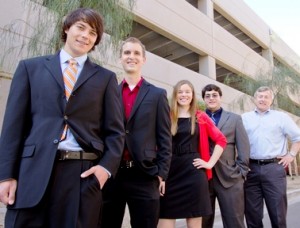
FlashFood team looks at going global with venture to help alleviate hunger
Posted: June 28, 2012

Members of the FlashFood team include (left to right): Jake Irvin, a marketing and sustainability graduate; Eric Lehnhardt, a biomedical engineering graduate; Katelyn Keberle, a materials science and engineering major; Steven Hernandez, a computer science graduate; and the team’s faculty advisor Richard Filley. Photo by: Jessica Slater/ASU
A team of three recent Arizona State University graduates and one undergraduate are on their way to Sydney, Australia to represent the United States in the premiere international student technology competition July 6-10.
The team named FlashFood earned the trip to the Microsoft Imagine Cup World Finals by winning the 2012 U.S. Imagine Cup finals in April at the Microsoft company headquarters in Redmond, Wash.
It’s the second year in a row a team of ASU students won the U.S. Imagine Cup finals and will go to the world finals.
The prizes for FlashFood’s win in competition with more than 20 student teams from throughout the country included $8,000 to help fund the team’s entrepreneurial venture, as well as a $10,000 donation to ASU. Now FlashFood will compete for additional support against teams from about 75 other countries in the world finals.
FlashFood’s winning project involves a mobile phone application to help establish a network to connect restaurants, hotels, catering and banquet services with teams of people who would collect leftover and excess food and transport to community centers, churches and other neighborhood locations where it can be distributed to people in need.
The idea for the endeavor emerged from the Engineering Projects in Community Service program (EPICS) in ASU’s Ira A. Fulton Schools of Engineering, and from team member Jake Irvin’s involvement with Students In Free Enterprise, a global entrepreneurial non-profit organization with affiliate groups at more than 1,500 universities.
Irvin, a recent marketing and sustainability graduate, will go to the Imagine Cup World Finals with teammates Eric Lenhardt, the team leader and a recent biomedical engineering graduate, Katelyn Keberle, a junior studying materials science and engineering, and computer science graduate Steven Hernandez.
Richard Filley, director of the EPICS program and the team’s faculty adviser, will accompany the students to Australia.
Microsoft requires teams to send only four representatives to the Imagine Cup competitions. Other FlashFood members are Loni Amundson, a recent sustainability graduate, and computer science graduate Ramya Baratam.
With the focus of the competition expanding to a global scale, the members of FlashFood have been working to adapt their venture to an operations model that could be applied to various types of communities throughout the world.
They are working with international groups and organizations to research the issue of food insecurity on a global scale.
“We’ve been holding focus groups, and generating dialogue with friends and colleagues from countries around the world, so that FlashFood can fight hunger and food waste internationally,” Keberle says.
Competing in the Imagine Cup Worldwide Finals will give the team “an opportunity to expand our product and form it into something that can be applied in any country,” she says.
“Around the world, there are certain similarities that could make FlashFood effective in different countries,” Keberle says. “Regardless of location, individuals in poverty do have access to cell phones, and there are several international hotel chains that face similar food-waste challenges.”
Through the Imagine Cup, the multinational Microsoft computer-technologies and services corporation encourages students to develop creative technology-based solutions that solve real-world problems.
The program began in 2003 with only 1,000 students on participating teams. It has since grown into one of the largest student technology competitions in the world. By last year about 350,000 students from 183 countries were members of teams that entered the first rounds of Imagine Cup competitions.
FlashFood is going into the Imagine Cup World Finals with an impressive track record. The team has won awards and support from several competitions and programs, including the ASU Innovation Challenge, the Entrepreneurs @ ASU Elevator Pitch, the ASU 10,000 Solutions Leap Day Challenge and the international Dell Social Innovation Challenge People’s Choice Awards.
The team has also won a $12,000 grant from ASU’s Edson Student Entrepreneur Initiative, which brought them support in the way of office space and mentoring from experienced entrepreneurs
In addition, FlashFood was recently selected as a semifinalist in the 2012 Global Sustainability Challenge, a national competition Nov 7-9 in Louisville, Ky., hosted by YUM!
YUM! is the world’s largest multinational fast-food restaurant company. Its Global Sustainability Challenge supports students in efforts to develop innovative ways to implement sustainability practices in the areas of waste and recycling, product packaging, water and energy consumption and green building design and construction.
By Joe Kullman and Natalie Pierce



































